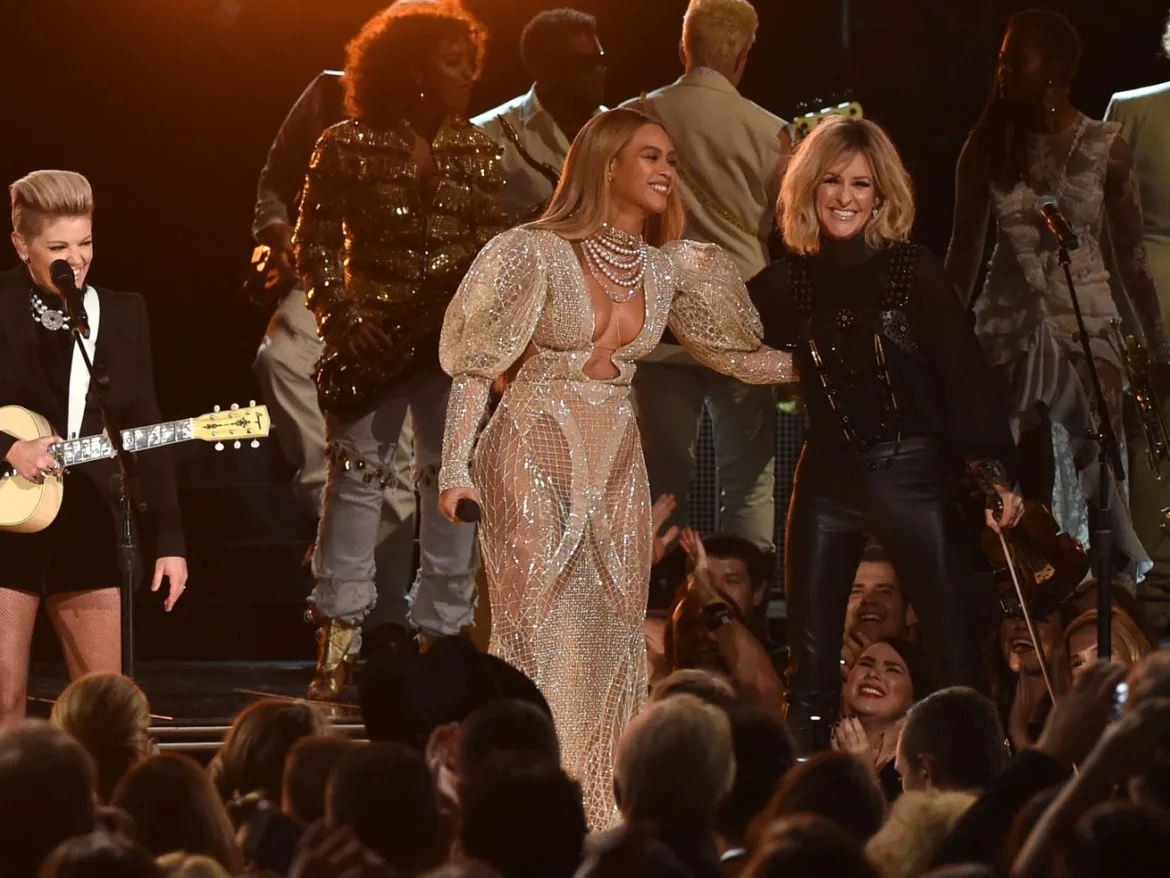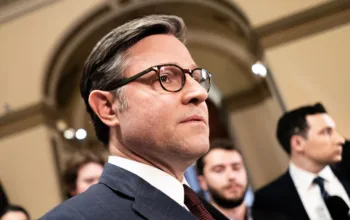The backlash over Beyoncé and the Chicks’ CMAs performance is really a fight over country music’s politics.
Editor’s note, March 19, 2024, 1:20 pm: On March 19, 2024, Beyoncé posted on Instagram that her upcoming album, Act II: Cowboy Carter — the first two singles from which are propelling her to the top of the Hot Country Songs chart — was inspired by “an experience [she] had years ago where [she] did not feel welcomed … and it was very clear that [she] wasn’t.” Some speculate she was referring to this 2016 CMAs performance with the Chicks. (The Chicks changed their band name in 2020, after this piece was published). For more on how that performance was received at the time, check out this piece below.
Even if you want to, it’s impossible to forget a Beyoncé performance. Just ask the Country Music Association.
On Wednesday, Beyoncé performed with the Dixie Chicks at the CMA Awards — one of the biggest stories of the awards show and one of the biggest stories of the entire night. The performance wasn’t as show-stopping as Bey’s Super Bowl halftime appearance or her VMAs performance, but it was still riveting in that you had the biggest music superstar on the planet play at a music awards show that doesn’t necessarily align with her established genre. (She performed “Daddy Lessons” a country song off her album Lemonade.)
But even though Beyoncé is considered a deity by millions of adoring fans, a backlash quickly gained momentum. Some viewers responded to the performance by tweeting and vocalizing their displeasure with the singer. Some of their sentiment was due to Beyoncé’s liberal-leaning politics, some of it was rooted in her perceived lack of country cred, and some of it was downright racist.
Grumbling responses to awards show musical performances are nothing new (see: the Chainsmokers at the MTV Video Music Awards this year). But what’s strange about this situation in particular is that in the wake of the grumbling, the CMA erased a promotional social media post featuring Beyoncé and the Dixie Chicks’ performance — convincing some observers that even though the CMA said it was due to the footage being unapproved, the organization was bending to conservatives and racists upset with the singer’s appearance at the awards.
The gross, deplorable, racist reactions aside, there’s something fascinating here that extends beyond Beyoncé. It’s a fight about how politics has informed the way we consume and critique pieces of art, and how politics has come to define the identity of country music.
This is a bigger fight over politics, and the identity associated with country music
On the surface, the fight looks pretty simple: Country music is a conservative space, and Beyoncé, particularly in her most recent album Lemonade, sings about and uses imagery in regards to race, the Black Lives Matter movement, and police brutality — subjects that are seemingly incongruous with contemporary conservative ideals.
Perhaps the more pertinent question to ask is why that is: Why is it a given that country music is considered a conservative space? Why is the genre political at all?
In general, arts and entertainment is more politically aware than it was a decade ago. There are national conversations every week about representation in comic books, how a television show is depicting people of color, who’s getting cast in movies and who isn’t, and whether certain songs are sexist — just like there are conversations about which artists support Black Lives Matter, or which movies depict the war the best, or which singers are good influences.
And there’s a tendency to conflate the politics of a television show, comic book, song, movie, or musician with quality. The idea is that if a work is aligned with your political beliefs, you’re more likely to think it’s good and consume it, and vice versa.
“If politics are going to be another kind of aesthetic preference — and, for some people, a very important one — then we shouldn’t be remotely surprised when some people turn out to like conservative country music more than the Rolling Stones’ latest album, or to prefer Alex Jones’s fevered commentary on American life to Shonda Rhimes’ interpretations,” the Washington Post’s Alyssa Rosenberg wrote last year.
Doctor Strange and its casting of white, British actress Tilda Swinton as a Tibetan comic book character and the lack of diversity in J.K. Rowling’s Fantastic Beasts and Where to Find Them are two recent examples where politics and social conscience affected people’s impressions of the movies even before their release.
Country music is another example.
Back in 2015, Ted Cruz — then a potential Republican presidential nominee — spoke to this very idea. He said that in the wake of the 9/11 attacks, his music taste shifted from rock to country because of the politics in each genre.
“My music taste changed on 9/11,” Cruz told CBS. “I actually intellectually find this very curious, but on 9/11, I didn’t like how rock music responded.” He added, “And country music, collectively, the way they responded, it resonated with me.”
What Cruz is implying is that country represented a firmer, more aggressive response. And if he’s talking about Toby Keith’s “Courtesy of the Red, White, and Blue (The Angry American),” a more jingoistic, perhaps violent, response, too. Rock musicians responded very differently.
“The rockers were mourning victims and celebrating freedom; country stars were demanding blood,” New York magazine’s Jonathan Chait wrote. “That was a real partisan cultural divide. That divide overlaid a related cultural trend during the Bush years, during which the Republican Party defined itself as the representative of ‘real America,’ as represented by pickup trucks, NASCAR, small towns, country music, and the most rigidly nationalistic forms of patriotism.”
Granted, there are outliers to this theorem — there are country singers who are seen as progressive. But their existence and the attention their politics frequently receive illustrate many of Chait and Cruz’s points.
Kacey Musgraves is wildly talented and a brilliant songwriter — try to listen to “High Time” and not find yourself swaying. But she also garners a lot of attention for writing songs that, compared with the rest of the country genre (or what people think of country as a whole), are progressive.
Taylor Swift’s shift from country to pop inspired a thousand think pieces, some of which touched on her personal political beliefs when it came to songs like “Welcome to New York,” which contains a lyric about the LGBTQ community. There’s also the counter-theory that Swift’s politics are just self-serving, that she’s figured out how to game politics to sell albums.
And of course there are the Dixie Chicks, who in 2003 had their songs banned on country radio stations across the country after they criticized President George W. Bush.
If conservative ideals are truly baked into country music, it’s easy to see why a number of fans wouldn’t approve of Beyoncé — especially in 2016, which has been largely defined by an especially contentious presidential election and the rhetoric perpetuated by Donald Trump as the Republican nominee.
But whether you’re a fan who likes these ideals or opposes them, thinking about any kind of genre or art as politically monolithic is limiting. For country, it ignores the genre’s rich history, which has been punctuated and shaped by talented, politically complicated artists like Loretta Lynn, Johnny Cash, and Dolly Parton. It also ignores the power of art to be something bigger, something less rigid than politics, and ends up flattening it into something maddeningly simple.
The Country Music Association says it pulled its social media posts at Beyoncé’s request
In the wake of the social media scrubbing, TMZ reported that the Country Music Association’s decision to delete the posts was directly influenced by its fans and viewers:
Sources directly connected with the CMAs tell TMZ, the honchos folded to fans who posted racist and other harsh comments. We’re told the honchos were especially concerned about the reaction to Beyonce’s support and the support of the Dixie Chicks for the Black Lives Matter movement …
We’re told the CMA people “just want this to go away” and feel it was probably a mistake to invite the 4 women in the first place.
What gives this narrative credence in the eyes of many observers is that an unverified Twitter account that appears to belong to Dixie Chicks member Natalie Maines released a series of tweets implying that her group and Beyoncé were wronged:
@mhjellm629 We were in Bey’s world not the CMA world;)
— Natalie Maines (@1NatalieMaines) November 3, 2016
Hey everybody!The CMA’s just called and asked us to co-host next year’s show with Beyoncé.Unfortunately I’ve got a thing that night so, no.
— Natalie Maines (@1NatalieMaines) November 3, 2016
The gist: (assuming that Maines is indeed the person who tweeted those statements) If anyone aside from Beyoncé knows what really happened, it should be the people who appeared onstage with her, right?
But the official word according to the CMA is that it deleted its promotional posts about the performance because Beyoncé asked it to.
“Beyoncé’s team hadn’t approved that, so we pulled it down,” Sarah Trahern, chief executive of the CMA, told the New York Times. “Fans can get kind of passionate and read other things into it.”
Trahern takes care to note that Beyoncé provided her own photographer and team, and that there were promotional videos on Beyoncé’s own personal website as well as ABC’s website (ABC was the TV network that broadcast the awards). She pushes back against the idea that the CMAs wanted to pretend like Beyoncé and the Dixie Chicks never performed at the awards.
“It’s about the music, not about politics,” Trahern told the Times.
Trahern refers to music and politics as if they’re separate, exclusive entities. The backlash against her awards show’s inclusion of Beyoncé, and the backlash to that backlash, should be proof enough that for a lot of people, they aren’t.



